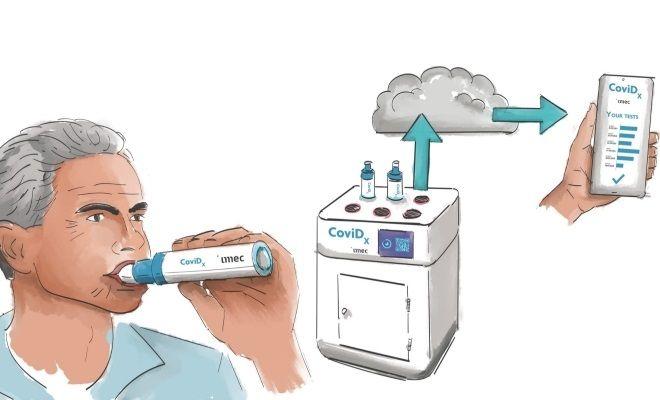Comparison with existing tests
Current diagnostic tests for SARS-CoV-2 have their faire share of limitations. The most sensitive and reliable tool today is the PCR test that aims at detecting the virus's genetic material in a nasopharyngeal specimen. This tool's downside is that trained medical personnel must collect the swab, and the process is described by many as highly uncomfortable. Moreover, the test has to be processed in a clinical lab and this takes on average two days.
Rapid antigen tests are more complex and as a result less reliable. The third type is the serological test which uses a blood sample. This is faster and less expensive than a PCR test but only detects whether someone has developed antibodies and therefore has been in contact with the virus, not whether he still has an active infection. .
Peter Peumans, CTO Health Technologies at imec: “None of the existing testing methods can determine to what extent someone can still pass the virus to others. That is why we have teamed up with UZ Leuven and have started developing a test that indicates, in less than five minutes, whether someone is carrying the SARS-CoV-2 virus and whether they have a high probability of being contagious. An important factor is that our solution is also very accessible: it looks for virus particles in a person's exhaled breath. Research has shown that breath particles are the virus's main transmission method."
"Thanks to the new tool, testing for the coronavirus will be easier, faster, more comfortable, and possible on a much larger scale. Moreover, we are designing our test to quickly and flexibly cope with the rise of other viruses and germs that spread via exhaled particles – such as influenza, RSV, and tuberculosis."
Clinical validation at UZ Leuven
In the meantime researchers have started developing the underlying technology and analysis devices. The second phase will include the clinical validation in collaboration with UZ Leuven specialists.
"With the know-how on the development of molecular diagnostic tests we have built over the years, we will support an extensive clinical trial," according to professor Katrien Lagrou, head of the molecular diagnostic lab at UZ Leuven. “We believe that such a rapid test could be widely applicable, also for a fast screening of potentially contagious patients or medical staff at hospitals”
By the summer of 2021, researchers plan to test a functional prototype at Brussels Airport, to ensure that the final solution meets all requirements needed to enable people to travel and meet up again safely and comfortably.

